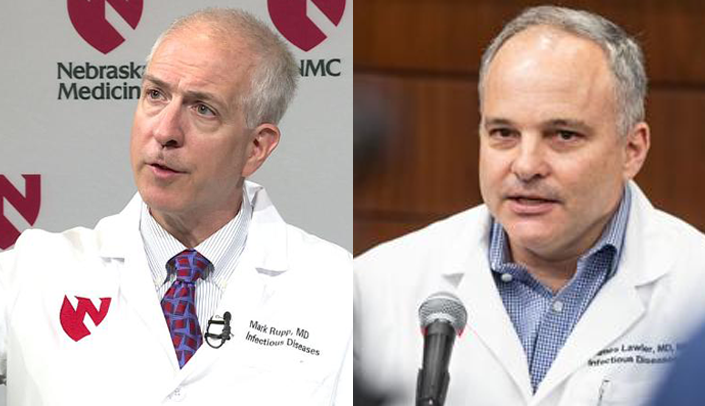The GCHS faculty spotlight this month highlights two physicians who have played key roles in our COVID-19 efforts.
Dr. Mark Rupp (left) is a Professor and Chief of the Division of Infectious Diseases in the Department of Internal Medicine at the University of Nebraska Medical Center. He is also the Medical Director of The Nebraska Medical Center Department of Infection Control & Epidemiology and an Associate Director of the Antimicrobial Stewardship Program. Currently he is the SME for issues dealing with infectious diseases and infection control as it relates to pandemic planning and daily operations.
Dr. Rupp received his medical degree from Baylor College of Medicine, Houston, Texas, and holds a Bachelor of Science degree in Chemical Engineering from the University of Texas, Austin, Texas. He underwent internship and residency training in Internal Medicine and completed Fellowship training in Infectious Diseases at Virginia Commonwealth University.
He is a Diplomate, American Board of Internal Medicine in the subspecialty area of Infectious Diseases. He is a Fellow of the American College of Physicians (ACP), the Infectious Diseases Society of America (IDSA), and the Society for Hospital Epidemiology of America (SHEA). He is a Past-President of SHEA. Dr Rupp has served as a consultant for the U.S. Food and Drug Administration, the Centers for Disease Control and Prevention, NIH, and VA. He recently served as the Chief-of-Staff at Nebraska Medicine.
Dr. Rupp has published over 450 articles, chapters, and abstracts. He frequently presents papers at national and international meetings, serves as a guest lecturer, and is an active teacher and researcher. Dr. Rupp’s research interests are in the areas of healthcare-associated infections and antimicrobial stewardship.
Dr. James Lawler (right) is the Global Center for Health Security Executive Director for International Programs and Innovation, Associate Professor of Medicine in the Infectious Disease Division at UNMC, and Director for Clinical and Biodefense Research at NSRI. He is also an adjunct Associate Professor of Medicine at the Uniformed Services University of the Health Sciences (USUHS). His career has focused on research and policy related to emerging infectious disease threats and medical and public health preparedness. He has called upon his vast array of national and international contacts to help inform Nebraska Medicine’s COVID-19 clinical and research efforts. Dr. Lawler was invited by Department of Health and Human Services Assistant Secretary for Preparedness and Response (ASPR) to serve as a subject matter expert for infectious disease disaster response and infection prevention and control for the operation that rescued American passenger from the cruise Diamond Princess, which was experiencing an intense outbreak of COVID-19, and air-transported the passengers back the U.S. for quarantine and isolation.
Before joining the UNMC/NSRI team in November 2017, Dr. Lawler served 21 years in the U.S. Navy Medical Corps. He previously served on the White House staff in both the Homeland Security Council Biodefense Office and the National Security Council Resilience Directorate, where he led development and coordination of national policy related to medical and public health preparedness, pandemic and public health emergency response, medical countermeasure R&D, biosurveillance, and clinical care for domestic and international health threats. Other assignments included Principal Investigator and Instructor at the U.S. Army Medical Research Institute for Infectious Diseases (USAMRIID), Chief Medical Officer for the National Institute for Allergy and Infectious Diseases (NIAID) Integrated Research Facility at Fort Detrick, and Deputy Director of the U.S. Central Command’s Joint Combat Casualty Research Team, overseeing all Department of Defense (DoD) medical research in the Afghanistan theater of operations.
Dr. Lawler spent his last five years on active duty founding and developing the Austere environments Consortium for Enhanced Sepsis Outcomes (ACESO), an international research collaboration headed by Naval Medical Research Center that is focused on improving sepsis survival in resource-limited settings. ACESO now conducts high-impact research in 6 countries across 4 continents. Dr. Lawler is a subject matter expert in infectious disease outbreak response and research, with field experience in multiple viral hemorrhagic fever outbreaks in sub-Saharan Africa. In May of 2014, Dr. Lawler deployed to Conakry, Guinea as a World Health Organization (WHO) clinical consultant, working alongside Medecins Sans Frontieres and an international team to improve clinical care in Ebola treatment units. He assisted the DoD Joint Staff force health protection planning process for West Africa Ebola response (Operation United Assistance), briefing the Chairman, Joint Chiefs, and senior Pentagon officials on multiple occasions. In October 2014, Dr. Lawler was the lead trainer standing up the DoD Northern Command’s Ebola Medical Support Team, created in response to a direct White House tasking for DoD support of U.S. hospitals, and served as the team’s principal technical expert. Additional operational and field medical experience include duty as a Marine infantry battalion surgeon, in disaster relief operations aboard the hospital ship USNS Comfort, and with the NATO Role 3 Hospital in Kandahar, Afghanistan.
Dr. Lawler is board certified in internal medicine and infectious diseases and is a diplomate in tropical medicine and travelers’ health. He completed his fellowship in infectious diseases at the combined National Naval Medical Center (NNMC)/Walter Reed Army Medical Center program and his internship and residency in internal medicine at NNMC in Bethesda, MD. He received a Master of Public Health degree from USUHS. Dr. Lawler graduated from Georgetown University School of Medicine after receiving his undergraduate degree in biomedical engineering from Duke University.
